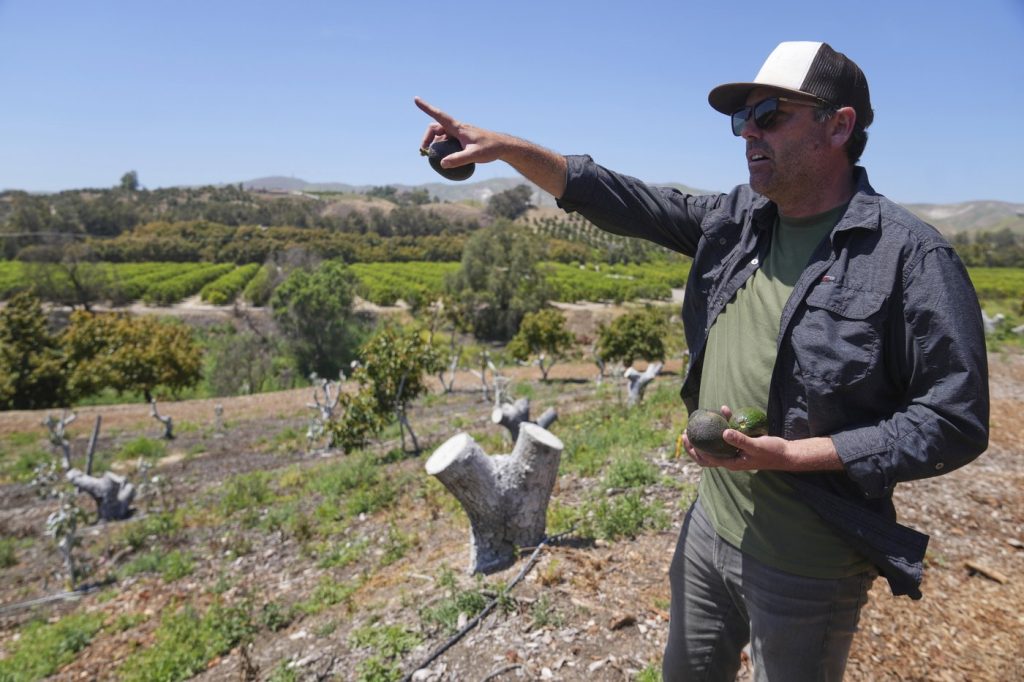SOMIS, Calif. (AP) – Andreas Tompros, a 47-year-old avocado grower, faced devastating losses last year due to a wildfire that destroyed his home and a significant portion of his orchard. Despite this setback, Tompros remains optimistic about the future of his farm. California avocado farmers, who often contend with challenges like high labor costs and water restrictions, find unexpected support from Mexican avocado imports.
Since the United States lifted the ban on Mexican avocados in 1997, Californian growers initially feared that these imports would threaten their market. However, they have found that the consistent supply of avocados from Mexico has bolstered their sales by creating a year-round demand. Before the influx, avocados were seen as seasonal specialties, primarily marketed in California. The increased availability has shifted consumer perceptions, leading to a surge in popularity for avocados, making them commonplace in restaurants and grocery stores across the country.
The consumption of avocados in the U.S. has skyrocketed over the past two decades. Between 2000 and 2021, the amount of avocados available per person tripled to over 8 pounds (3.6 kilograms), reflecting the growing trend of avocado toast and guacamole becoming staples not only in culinary hotspots like New York City but also in cafes throughout the Midwest and the South.
On a sunny hillside northwest of Los Angeles, Tompros is replanting nearly 300 avocado trees, confident that the American appetite for avocados will only continue to grow. He believes that his orchard will eventually rebound to be even better than before. The increasing consumer interest in healthy fats has significantly boosted avocado demand, as noted by Emiliano Escobedo, executive director of the Hass Avocado Board.
A law enacted in 2000 established the Hass Avocado Board, which collects a nominal fee for each pound of avocados imported or produced in the U.S. This funding is utilized for marketing and nutritional research, ultimately enhancing avocado visibility in supermarkets and restaurants. Richard Sexton, a distinguished professor at the University of California, Davis, emphasized the board's success in driving consumption growth compared to other fruits.
Currently, around 60% of U.S. households purchase avocados, with a significant portion of consumption concentrated among a smaller subgroup, indicating potential for further market growth, particularly in the Northeast, where avocados are less prevalent. Escobedo points out ample opportunities for increased avocado purchases among certain demographic groups.
Despite political threats of tariffs on Mexican goods by the Trump administration, avocados have largely escaped scrutiny. California growers support the uninterrupted flow of Mexican avocados while also advocating for stringent U.S. inspections to prevent pests that could harm their crops. Ken Melban, president of the California Avocado Commission, highlighted the favorable conditions for avocado farming in California, noting that the state produces around 10% of the nation’s avocados.
Though California is primarily responsible for domestic avocado production, Mexican imports provide essential year-round supplies to meet the national demand. In Ventura County, many growers are transitioning to avocados after facing lower lemon prices due to competition from Argentina. As new avocado trees begin to produce fruit in the coming years, this area's avocado output is poised to increase significantly, according to Korinne Bell, the agricultural commissioner for Ventura County.
The demand for avocado trees has surged, especially among lemon growers, following the devastating fire that impacted Ventura County’s avocado orchards. Rob Brokaw, whose family-owned nursery has provided avocado trees to California growers for 70 years, reported being nearly sold out. Following the wildfire, Tompros contemplated whether to plant fire-resistant lemon trees or replant avocados. Ultimately, he chose avocados due to the high demand for guacamole during events like the Super Bowl.
Tompros is taking precautions to plant his new avocado trees away from the future site of his rebuilt home, considering the fire hazard posed by dry leaves. While it will take a few years before the newly planted trees yield fruit, he is hopeful about selling to local packinghouses or through seasonal gift boxes that include citrus and passionfruit.











